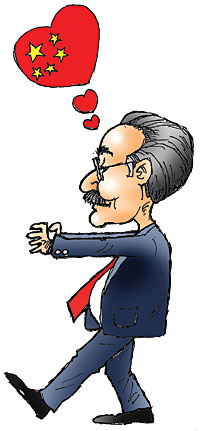 BILASH RAI |
The elaborate ritual involved with the acceptance of a mere letter from the Chinese infuriated the British Resident Brian Houghton Hodgson so much that he wrote: 'But my situation is by no means so agreeable as it might be if these barbarians did but know their own good. Instead of which they are insolent and hostile, and play off on us, as far as they can and dare, the Chinese etiquette and foreign polity.'
Little did Hodgson know that the Chinese were similarly told to remain watchful of British incursions in Tibet. Chandra Shamsher, the strongest and most influential of all hereditary Rana prime ministers, felt so helpless in front of the British resident that he fervently wished for the permanent occupation of Tibet by the Chinese. Once the Chinese PLA overran the Potala in 1950, King Mahendra rejoiced at the prospect of playing Beijing and New Delhi against each other.
Mahendra soon learnt that being at the centre of regional conflict had its costs. When the wily monarch toyed with the idea of threatening India with a land route to Lhasa, Indira Gandhi dared him to approach China and Beijing coerced him into accepting the albatross that connects Kathmandu with nowhere on the Tibetan border.
American historian Leo E Rose was to note later: 'Nepal had paid a high price in economic terms and in its relationship with India for this useless road.' Even though a railway line now connects Lhasa with mainland China, the traffic on the road to Khasa bordering Nepal continues to be sparse.
After his 'Zone of Peace' proposal in 1975 and its prompt endorsement by the Chinese, King Birendra made regular trips to Beijing without much to show for his sincere efforts. In fact, it was the other way round as increased trade. It's a tribute to super-suave Chinese diplomats that they have succeeded in selling their commercial interests as goodwill gestures.
The anti-aircraft guns bought from the Chinese in 1988 proved to be extremely expensive to Nepalis: the resulting economic blockade enforced by Indians crippled the economy.
No one ever learns anything from history. Within a fortnight of his first diplomatic trip to New Delhi, former king Gyanendra went to Beijing with the hopes of engaging the northern neighbour more closely in the counter-insurgency operation against the Maoists. Enthused with the courtesy of his hosts, he gushed that China was a "trustworthy" friend.
Whether he was manipulated to make Afghanistan's entry into SAARC conditional upon securing an observer status for the Chinese in the South Asian club is not sure, but the countdown of the end of Shah monarchy probably began with Gyanendra's defiant posturing at the 13th Summit at Dhaka. The king was to regret later that the northerners turned out to be fair-weather friends.
Pushpa Kamal Dahal wanted to show that he was making history by visiting Beijing before going on the ritual pilgrimage to New Delhi. But conciliatory gestures from a leader who repeatedly branded the regime in Beijing 'reformist' from his safe houses in the Indo-Gangetic plains have failed to impress the inheritors of Great Helmsman's mantle. Unsure of the prospect of any one political player, the Chinese have decided to spread their diplomatic eggs in many baskets.
From Koirala heir-apparent Sujata to maverick Matrika, promising politicians of all persuasions are being welcomed in Beijing with open arms. Within days of Upendra Yadav's return, Chairman Jhalnath Khanal went with a jumbo UML team to the land of market-Maoism. Now it's the turn of Prime Minister Pushpa Kamal Dahal to make his first 'formal' visit.
Perhaps it's too early to tell, but Dahal's communist predecessor at Baluwatar failed miserably with rhetorical innovations of 'equi-proximity' in foreign policy for India-locked Nepal. Dahal's expedition to the north will probably test the integrity of Maoist diplomacy. That may also determine the longevity of the leftist coalition in Singha Darbar, and nobody knows it better than Prime Minister Dahal.



